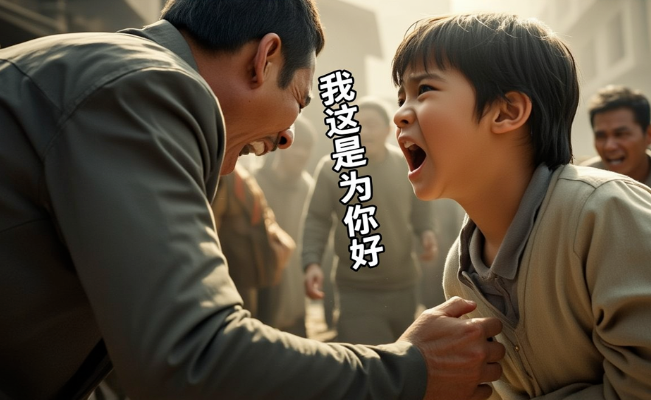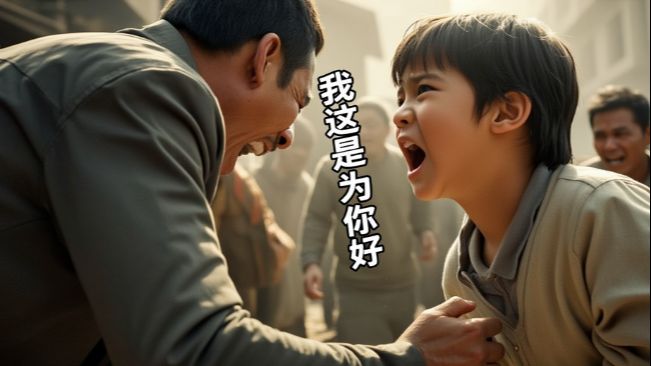In the long journey of educating children, the most heartbreaking scene is: parents either beat or scold their children when they are emotionally out of control, but after the storm, they use "I'm for your own good" to justify their behavior. This seemingly loving excuse often becomes the most difficult emotional shackle in children's hearts. It constructs a paradox of intertwining love and pain, blurs the boundaries between abuse and care, and puts children's cognition and emotions into a maze of chaos. Behind this educational method, there are complex psychological motivations, distorted communication patterns and intergenerational transmission trauma, which urgently requires us to conduct in-depth analysis and reflection.

1. The psychological essence of "for your good": rationalization mechanism and cognitive dissonance
After venting, parents emphasize "for your good" not all hypocrisy, but a complex psychological defense mechanism is operating.
Relieving cognitive dissonance: According to the psychologist Fistinger's theory of cognitive dissonance, when people's behavior (beat and scolding) conflicts with self-cognition ("I am a good parent who loves children"), strong psychological discomfort will occur. In order to reduce this discomfort, an individual must change a certain cognition. Obviously, changing the perception of "I am a good parent" is too painful, so the easiest way is to change the interpretation of behavior - redefining "beating and scolding" as "a way of love and education." By labeling “for you good”, parents successfully rationalize hurtful behavior, temporarily alleviating inner conflict and guilt.
Rationalization of power and control: Beating and scolding is essentially the most direct control method in the aversed relationship of power. "For your own good" puts a moral cloak on this abuse of power, equating control with care, and equating obedience with success in education. It cleverly shifts the focus from “I’m out of control” or “I need to use violence to get you obedient” to “I’m executing an education that benefits you”, thus maintaining the authority and moral correctness of parents in the relationship.
Intergenerational inheritance of emotional expression: Many parents who educate their children in this way often grow up in a model similar to "beating and scolding + doing your good". They have never learned how to express love and anger in a healthy way, and their emotional dictionary is full of contradictory entries. Therefore, they subconsciously copied the only familiar interaction pattern and believed that this was indeed a manifestation of "good". This is a profound intergenerational tragedy.
2. Invisible harm to children: emotional kidnapping and cognitive distortion
The three words "for your own good" hurt children's souls, sometimes even more profound and complex than beating and scolding themselves.
The confusion between emotional kidnapping and love: This is a cruel emotional kidnapping for children. It forces the child to be grateful to the perpetrator while accepting the harm. This will seriously distort the child's understanding of "love". They would think that love is accompanied by pain, humiliation and control, so that in future relationships, they are likely to be either used to please others or identify with the abuser, repeating this toxic relationship pattern.
Confusion and low value of self-cognition: children cannot understand this contradiction. If they believe that their parents are "for their own good", they must admit that being beaten and scolded is because they "deserved to be sinful", and they are "bad" and "beat"; if they feel injustice and hurt, they must face the more terrifying reality that "parents do not really love themselves". Most children will choose the former because admitting that they are bad is easier than admitting that their parents don’t love them. This directly leads to a serious lack of low self-esteem and self-worth—“Not only is I bad, I also let down my parents’ hearts for me.”
Obstacles in emotional recognition and expression: children’s true feelings (anger, grievance, sadness) are completely denied by their parents’ “for your good”. They are forced to suppress their true emotions, and over time, they will lose the ability to recognize and express their emotions healthily. They may become silent, retreat, or learn to treat others the same way—expressing concern with anger and connecting relationships with hurt.
External motivation replaces intrinsic motivation: True education aims to cultivate children's internal driving force and judgment. And the violent education of "for your good" relies entirely on external pressure and fear to drive behavior. Children learn and perform well not to explore the world’s fun or gain a sense of accomplishment, but to avoid punishment. Once external pressure disappears, behavior is likely to lose its direction.
3. Analysis of the root causes: Parents’ emotional dilemma and educational incompetence
Parents are trapped in the cycle of "beating, scolding, regret, and excuse", and the root cause is often multiple dilemmas that they are difficult to deal with.
Lack of emotional management and self-regulation ability: Many parents themselves are "emotional orphans" and they lack the ability to identify, accept and manage their emotions. Pressure at work, conflicts in marriage, anxiety in life... These negative emotions continue to accumulate, and weak and irresistible children become the safest "emotional trash can". Beating and scolding children is often the result of parents' emotional venting (Emotional Dumping) and has nothing to do with education. The afterward sentence "for your own good" is also a concealment of your own emotional loss.
The extreme lack of educational knowledge and methods: they don’t know there are other methods besides beating and scolding. They do not know how to guide their children through empathy, active communication, rules establishment, natural logical consequences, etc. When facing children's "disobedience", violence has become the only and most familiar "weapon" in their toolbox.
Deep insecurity and anxiety: Some parents project huge anxiety about the future onto their children. "What should I do in the future if I am not strict now?" "If I don't discipline now, society will teach him a lesson!" This educational concept rooted in fear has led them to adopt violent means that are eager for quick success and seem to be "immediate". What they beat was actually the self who was full of uncertainty about the future in their hearts.
4. The way to break the deadlock: From intergenerational cycle to rational nurturing
Breaking this harmful cycle requires parents to have great courage and profound self-awakening.
1. Parents’ self-awareness and emotional management
The first step to breaking the deadlock is to be honest and self-aware. Parents must bravely admit: "I just beat and scolded my child, because I was emotionally out of control, not out of education." You must learn to press the pause button when you are emotionally excited, leave the scene, and calm yourself down through deep breathing, temporary isolation, etc. Managing your emotions well is the first prerequisite for educating children.
2. Sincere apology and relationship repair
Afterwards, the child needs a sincere apology than the pale and powerless "for your good". "I'm sorry, my mother didn't control her emotions just now, and yelled at you/beat you. This is wrong. My emotions are my problem, not your fault." This can not only repair the relationship, but also demonstrate to the child what it means to take responsibility and sincere apology. This is an extremely precious example of example.
3. Learn non-violent communication methods
Replace accusations and beatings with the communication model of "statement of facts + expressing feelings + explaining needs". For example: "I saw you played three hours of games (facts), and I was worried (feelings), because I hope your eyes can get a rest and your homework can be completed on time (demand). Let's discuss the schedule together?"
4. Distinguish between behavior and personality
Always let your child understand: what I don’t accept is your behavior, not your person himself. You can criticize your child for fighting, but you must never label him as a "bad child". Unconditional love means that no matter what he does, he deserves to be loved, but he also needs to bear the corresponding consequences for his actions.
5. Seek professional help and self-growth
If you realize that you are deeply trapped in this pattern and it is difficult to extricate yourself, actively seeking psychological counseling or family education guidance is not a weakness, but a strong and responsible manifestation. Dealing with the trauma of your own native family and learning new parenting skills is the key to ending the intergenerational trauma cycle.
Conclusion
There is never a real equality between "beating and scolding" and "for your good fortune". The former is the catharsis of emotions and the abuse of power; the latter is the expression of love and the original intention of education. Forcibly binding them is tantamount to carving a wound on the child's soul that cannot be easily healed.
The real "for your good" is a guide based on respect, understanding, trust and patience. It requires parents to become emotionally stable and self-aware adults first, and then they can become containers for their children, accept their emotions, accommodate their impulses, and guide their behavior.
Education is a long practice, and its purpose is not to shape a "perfect child" who is absolutely obedient, but to use love and wisdom to assist another life to thrive. May every parent have the courage to examine themselves, break the cycle of "love and hate", and say to their children in a truly warm and firm way: "I'm for your goodness."
